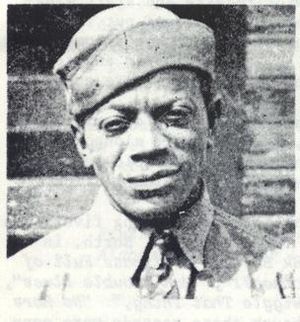Jaybird Coleman facts for kids
Quick facts for kids
Jaybird Coleman
|
|
|---|---|
 |
|
| Background information | |
| Birth name | Burl C. Coleman |
| Born | May 20, 1896 Gainesville, Alabama, United States |
| Died | January 28, 1950 (aged 53) Tuskegee, Alabama, United States |
| Genres | Country blues |
| Occupation(s) | Instrumentalist, singer |
| Instruments | Harmonica, guitar |
| Years active | 1926 – late 1940s |
| Labels |
|
| Associated acts | Rabbit Foot Minstrels Bessemer Blues Pickers Birmingham Jug Band |
Burl C. "Jaybird" Coleman (born May 20, 1896 – died January 28, 1950) was an American musician. He was known for playing the harmonica and singing country blues music. He also played the guitar. Jaybird Coleman was very popular in Alabama. He recorded many songs in the late 1920s and early 1930s.
Contents
Early Life and Music
Coleman was born in Gainesville, Alabama, United States. His family were sharecroppers. This meant they farmed land owned by someone else and shared their crops. Jaybird and his three brothers worked hard on the farm.
He learned about music from other sharecroppers. They sang traditional folk music songs. When he was 12, he started playing the harmonica. He mostly taught himself. His parents encouraged him to play music. It was a different path from their hard farm work. He played music at local dances and parties for small payments.
Army Days and a New Name
In 1914, when World War I began, Coleman joined the United States Army. He stayed at Fort McClellan during the entire war. While in the Army, he was known for being very independent. He often did not follow the strict Army rules.
Because of this, his officers started calling him "Jaybird." This nickname stayed with him for the rest of his life. During his time in the Army, he performed for large groups. He entertained his fellow soldiers. After leaving the Army, he went back to Gainesville for a short time. He worked as a farm laborer. Soon after, he moved to Bessemer, Alabama, with his younger brother, Joe. There, he became a full-time musician.
Musical Journey
In 1922, Coleman started touring Alabama with singer and guitarist Big Joe Williams. After that, he traveled for two years with the Rabbit Foot Minstrels. This was a very popular traveling tent show. He performed all over the Southern United States.
When he returned to Bessemer, Coleman married a popular local singer. They performed together as a duo to support themselves. The Colemans went to church regularly. They were well-known in the black community for singing gospel songs. As a blues musician, Coleman was liked by both black and white audiences. Sometimes, he would walk through the streets playing his harmonica. This would often draw a crowd of people who followed him.
Recording His Music
In 1926, Coleman began recording his music. He recorded for companies like Gennett Records, Silvertone Records, and Black Patti Records. He recorded as a solo artist and with a group called the Bessemer Blues Pickers. His records sold well. However, he felt he was never paid fairly for his work.
Coleman often performed with little or no other instruments. His style came from the work songs he heard as a child. He especially liked playing high-pitched E and D harmonicas. He used a special technique called "cross-harp" with a fast hand vibrato. In the 1930s, Coleman was part of the Birmingham Jug Band. He helped form this group. He recorded with them for OKeh Records and Columbia Records. In 1930, he recorded a song called "Coffee Grinder Blues" for Columbia. He stopped it from being widely released because of a payment disagreement. This makes it his rarest record.
Coleman continued to perform on street corners in Alabama throughout the 1930s and 1940s. By the end of the 1940s, he stopped appearing in the music scene. He passed away from cancer on January 28, 1950, in Tuskegee, Alabama.
Recordings and Legacy
- Jaybird Coleman & the Birmingham Jug Band, Complete Recorded Works in Chronological Order: 1927–1930 (Document, 1992)
 | Victor J. Glover |
 | Yvonne Cagle |
 | Jeanette Epps |
 | Bernard A. Harris Jr. |

